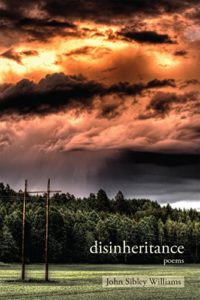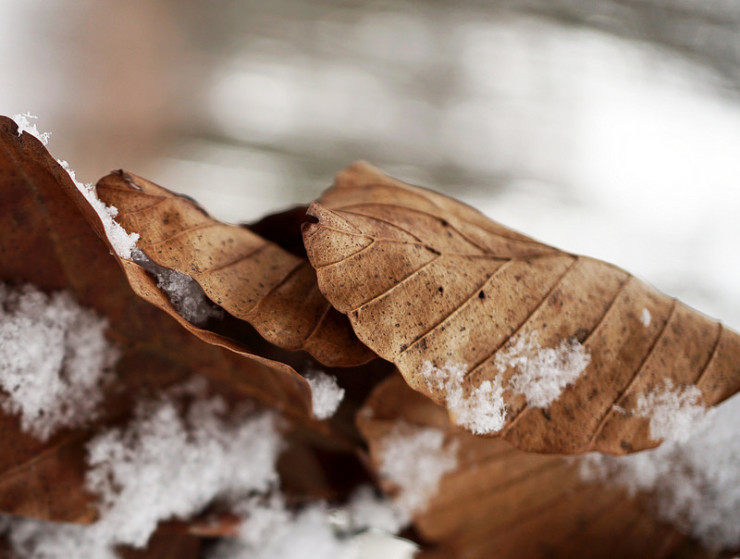I grew up in a culture that celebrated death as much as it did life. Barely a stone’s throw from the riot of Bourbon Street was St. Peter’s Cemetery No. 1—the first of the “cities of the dead” that New Orleans was equally famous for. Life and death were Mardi Gras on Shrove Tuesday blending seamlessly into Ash Wednesday. My childhood was a thin veneer of American ingenuity underlain by deep notions of fate and fatalism.
And grief. Grief was as integral to life as joy. My mother came from a very large, very extended family. Someone was always being born, someone was always being married, and someone was always being “waked.” I learned early that Catholic wakes always had food and alcohol; Protestant wakes might have water and cookies or mints, but the alcohol, like the grief, was outside, where the men gathered, passed around in bottles wrapped in brown paper bags.
Grief is part of life, but it’s a hard part, as poet John Sibley Williams describes in his new poetry collection Disinheritance. Grief is a way to recognize, process, and deal with loss, but the loss is never really behind us. Grief is an expression of our DNA—of where we come from, whom we’ve loved, who has loved us and influenced us and shaped us.
These poems by Williams are the kind where you want to know the backstory, even if the backstory is a fiction. Who is this dead boy who never had time to write on the stars, in “A Dead Boy Speaks to His Parents”? Whose ashes are being released, the ashes that will “never breathe this air, ” in “Eulogy”? And what kind of man is this grandfather, digging a double plot?
November Country

with his bare hands in case winter
can be shared
though he knows grandmother will outlive
her heart’s thaw by a decade.
I could give him a shovel. Instead
I ball the half-frozen river’s slack
numb around my fist, tighten
into ice. I will try to be less
hard next time.
Here in the gray
and two-dimensional house
we know the answer to rain.
A perforated black
arrow of birds moves
southward, away. Shrill reports
from every side and from the sky
the trajectory of abandonment.
Our surfaces are like the river.
Our circles have learned
to grow edges and crack.
Even the birds
we compare ourselves to
have left us.

John Sibley Williams
Reading poems like those in Disinheritance leave one in an emotionally pensive mood. You remember grandparents. You think of teachers in high school who were near retirement half a century ago. You’re reminded of parents and friends. Perhaps most of all, reading these poems makes you realize that grief is an expression of memory and connectedness, that it is a good thing, a measure of the people you have loved and have loved you.
Williams is the author of the poetry collection Controlled Hallucinations and six poetry chapbooks. He is also a literary agent, editor of The Inflectionist Review, co-director of the Walt Whitman 150 project, and marketing director of Inkwater Press. He lives in Oregon.
Disinheritance is a beautiful, moving collection.
Photo by Rosmarie Voegtli, Creative Commons, via Flickr. Post by Glynn Young, author of the novels Dancing Priest and A Light Shining, and Poetry at Work.
__________________________

“I require all our incoming poetry students—in the MFA I direct—to buy and read this book.”
—Jeanetta Calhoun Mish
- “Horace: Poet on a Volcano” by Peter Stothard - September 16, 2025
- Poets and Poems: The Three Collections of Pasquale Trozzolo - September 11, 2025
- Poets and Poems: Boris Dralyuk and “My Hollywood” - September 9, 2025

Bethany Rohde says
Thanks for sharing this, Glynn: “grief is an expression of memory and connectedness, that it is a good thing, a measure of the people you have loved and have loved you.”
Every stanza of November Country punches. The images stick and resonate:
“Our surfaces are like the river.
Our circles have learned
to grow edges and crack.”
Beautiful post and poem.
Glynn says
Bethany – thank you. I think all the poems in this collection are like that – they stick and resonate.
Maureen says
Some wonderful images in that poem!
I’ll have to read some of Williams’s work. Thank you for the introduction, Glynn.
Glynn says
Thanks for reading the post, Maureen!
Mike says
Beautiful collection of poems, have a copy .. sad and profound, yet very thought provoking. Highly recommend reading the collection ..
Glynn says
Thanks for the recommendation, Mike!
Bethany says
Mike, glad you read this and left your take on the collection. I don’t know if you’ve been here before, but welcome to the Tweetspeak Poetry community! Our cafe is a fun spot to get aquainted with our monthly offerings. All the best!
https://www.tweetspeakpoetry.com/mischief-cafe/
Mike says
Hi Beth, I left a review on Amazon as well 🙂 I do follow you guys, on twitter and via your site … being an avid reader of poetry and a writer thereof, I do enjoy discovering new meaningful poets .. John falls into that newly discovered category ..
Kind regards Mike